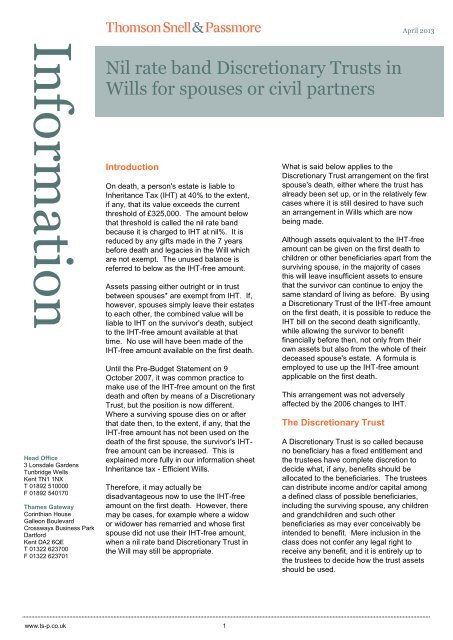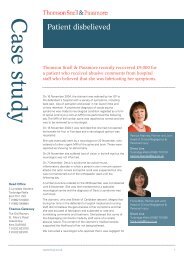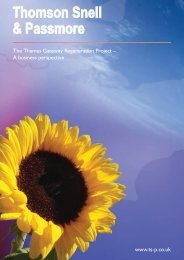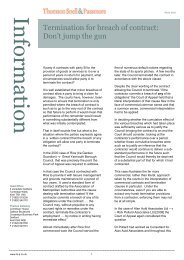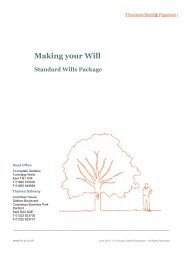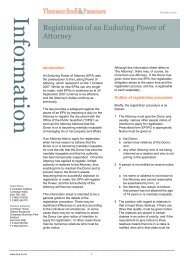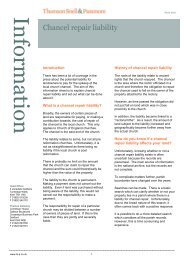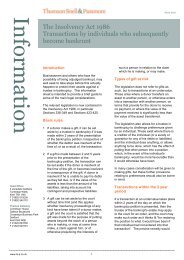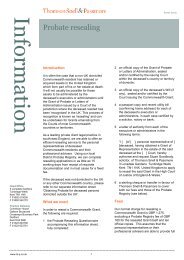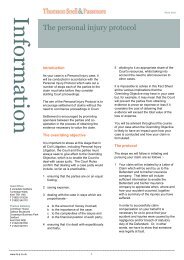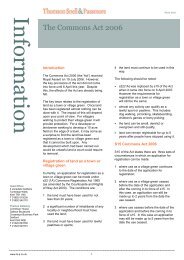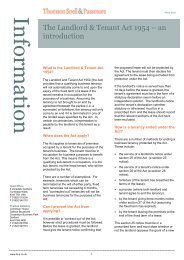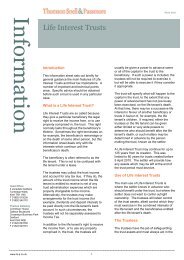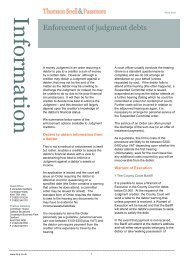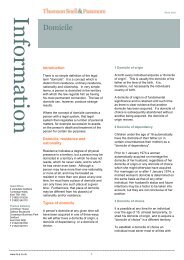Nil rate band Discretionary Trusts in Wills for spouses or civil partners
Nil rate band Discretionary Trusts in Wills for spouses or civil partners
Nil rate band Discretionary Trusts in Wills for spouses or civil partners
Create successful ePaper yourself
Turn your PDF publications into a flip-book with our unique Google optimized e-Paper software.
In<strong>f<strong>or</strong></strong>mation<br />
April 2013<br />
<strong>Nil</strong> <strong>rate</strong> <strong>band</strong> <strong>Discretionary</strong> <strong>Trusts</strong> <strong>in</strong><br />
<strong>Wills</strong> <strong>f<strong>or</strong></strong> <strong>spouses</strong> <strong>or</strong> <strong>civil</strong> <strong>partners</strong><br />
Head Office<br />
3 Lonsdale Gardens<br />
Tunbridge Wells<br />
Kent TN1 1NX<br />
T 01892 510000<br />
F 01892 540170<br />
Thames Gateway<br />
C<strong>or</strong><strong>in</strong>thian House<br />
Galleon Boulevard<br />
Crossways Bus<strong>in</strong>ess Park<br />
Dart<strong>f<strong>or</strong></strong>d<br />
Kent DA2 6QE<br />
T 01322 623700<br />
F 01322 623701<br />
Introduction<br />
On death, a person's estate is liable to<br />
Inheritance Tax (IHT) at 40% to the extent,<br />
if any, that its value exceeds the current<br />
threshold of £325,000. The amount below<br />
that threshold is called the nil <strong>rate</strong> <strong>band</strong><br />
because it is charged to IHT at nil%. It is<br />
reduced by any gifts made <strong>in</strong> the 7 years<br />
be<strong>f<strong>or</strong></strong>e death and legacies <strong>in</strong> the Will which<br />
are not exempt. The unused balance is<br />
referred to below as the IHT-free amount.<br />
Assets pass<strong>in</strong>g either outright <strong>or</strong> <strong>in</strong> trust<br />
between <strong>spouses</strong>* are exempt from IHT. If,<br />
however, <strong>spouses</strong> simply leave their estates<br />
to each other, the comb<strong>in</strong>ed value will be<br />
liable to IHT on the surviv<strong>or</strong>'s death, subject<br />
to the IHT-free amount available at that<br />
time. No use will have been made of the<br />
IHT-free amount available on the first death.<br />
Until the Pre-Budget Statement on 9<br />
October 2007, it was common practice to<br />
make use of the IHT-free amount on the first<br />
death and often by means of a <strong>Discretionary</strong><br />
Trust, but the position is now different.<br />
Where a surviv<strong>in</strong>g spouse dies on <strong>or</strong> after<br />
that date then, to the extent, if any, that the<br />
IHT-free amount has not been used on the<br />
death of the first spouse, the surviv<strong>or</strong>'s IHTfree<br />
amount can be <strong>in</strong>creased. This is<br />
expla<strong>in</strong>ed m<strong>or</strong>e fully <strong>in</strong> our <strong>in</strong><strong>f<strong>or</strong></strong>mation sheet<br />
Inheritance tax - Efficient <strong>Wills</strong>.<br />
There<strong>f<strong>or</strong></strong>e, it may actually be<br />
disadvantageous now to use the IHT-free<br />
amount on the first death. However, there<br />
may be cases, <strong>f<strong>or</strong></strong> example where a widow<br />
<strong>or</strong> widower has remarried and whose first<br />
spouse did not use their IHT-free amount,<br />
when a nil <strong>rate</strong> <strong>band</strong> <strong>Discretionary</strong> Trust <strong>in</strong><br />
the Will may still be appropriate.<br />
What is said below applies to the<br />
<strong>Discretionary</strong> Trust arrangement on the first<br />
spouse's death, either where the trust has<br />
already been set up, <strong>or</strong> <strong>in</strong> the relatively few<br />
cases where it is still desired to have such<br />
an arrangement <strong>in</strong> <strong>Wills</strong> which are now<br />
be<strong>in</strong>g made.<br />
Although assets equivalent to the IHT-free<br />
amount can be given on the first death to<br />
children <strong>or</strong> other beneficiaries apart from the<br />
surviv<strong>in</strong>g spouse, <strong>in</strong> the maj<strong>or</strong>ity of cases<br />
this will leave <strong>in</strong>sufficient assets to ensure<br />
that the surviv<strong>or</strong> can cont<strong>in</strong>ue to enjoy the<br />
same standard of liv<strong>in</strong>g as be<strong>f<strong>or</strong></strong>e. By us<strong>in</strong>g<br />
a <strong>Discretionary</strong> Trust of the IHT-free amount<br />
on the first death, it is possible to reduce the<br />
IHT bill on the second death significantly,<br />
while allow<strong>in</strong>g the surviv<strong>or</strong> to benefit<br />
f<strong>in</strong>ancially be<strong>f<strong>or</strong></strong>e then, not only from their<br />
own assets but also from the whole of their<br />
deceased spouse's estate. A <strong>f<strong>or</strong></strong>mula is<br />
employed to use up the IHT-free amount<br />
applicable on the first death.<br />
This arrangement was not adversely<br />
affected by the 2006 changes to IHT.<br />
The <strong>Discretionary</strong> Trust<br />
A <strong>Discretionary</strong> Trust is so called because<br />
no beneficiary has a fixed entitlement and<br />
the trustees have complete discretion to<br />
decide what, if any, benefits should be<br />
allocated to the beneficiaries. The trustees<br />
can distribute <strong>in</strong>come and/<strong>or</strong> capital among<br />
a def<strong>in</strong>ed class of possible beneficiaries,<br />
<strong>in</strong>clud<strong>in</strong>g the surviv<strong>in</strong>g spouse, any children<br />
and grandchildren and such other<br />
beneficiaries as may ever conceivably be<br />
<strong>in</strong>tended to benefit. Mere <strong>in</strong>clusion <strong>in</strong> the<br />
class does not confer any legal right to<br />
receive any benefit, and it is entirely up to<br />
the trustees to decide how the trust assets<br />
should be used.<br />
www.ts-p.co.uk 1
April 2013<br />
<strong>Nil</strong> <strong>rate</strong> <strong>band</strong> <strong>Discretionary</strong> <strong>Trusts</strong> <strong>in</strong> <strong>Wills</strong> <strong>f<strong>or</strong></strong> <strong>spouses</strong> <strong>or</strong> <strong>civil</strong><br />
<strong>partners</strong> (cont<strong>in</strong>ued)<br />
The flexibility of the arrangement enables<br />
the trustees, after the first death, to decide<br />
what should happen. The aim of the<br />
exercise is <strong>f<strong>or</strong></strong> the trustees, at their<br />
discretion, to pay any <strong>in</strong>come from the trust<br />
to the surviv<strong>or</strong>, <strong>or</strong> to allow the surviv<strong>or</strong> the<br />
use of any property (<strong>or</strong> share <strong>in</strong> any<br />
property) comprised <strong>in</strong> the trust, throughout<br />
their lifetime, but without the capital value<br />
be<strong>in</strong>g liable to IHT on the surviv<strong>or</strong>'s death.<br />
If necessary, some <strong>or</strong> even all of the capital<br />
can be transferred to the surviv<strong>or</strong> although,<br />
to the extent to which it is, the IHT sav<strong>in</strong>g on<br />
the surviv<strong>or</strong>'s death will be lost. Similarly,<br />
provided the surviv<strong>or</strong> has sufficient other<br />
assets, some <strong>or</strong> all of the capital can be<br />
made over to children <strong>or</strong> other beneficiaries<br />
dur<strong>in</strong>g the surviv<strong>or</strong>'s lifetime. It will n<strong>or</strong>mally<br />
be <strong>in</strong>tended that, after the surviv<strong>or</strong>'s death,<br />
the trust will be wound up and the assets<br />
distributed to the children <strong>or</strong> other<br />
appropriate beneficiaries.<br />
Both <strong>spouses</strong> may f<strong>in</strong>d it reassur<strong>in</strong>g if a<br />
letter of wishes has been addressed to the<br />
trustees ask<strong>in</strong>g them, albeit <strong>in</strong> a non-b<strong>in</strong>d<strong>in</strong>g<br />
way, to regard the surviv<strong>or</strong> as the pr<strong>in</strong>cipal<br />
beneficiary, and provid<strong>in</strong>g guidel<strong>in</strong>es as to<br />
how the trust assets should eventually be<br />
distributed.<br />
The IHT sav<strong>in</strong>g<br />
The capital value of the trust, whatever it<br />
may then be, will not <strong>f<strong>or</strong></strong>m part of the<br />
surviv<strong>or</strong>'s estate <strong>f<strong>or</strong></strong> IHT purposes. The<br />
trust is a sepa<strong>rate</strong> taxable entity. Subject to<br />
the po<strong>in</strong>t made <strong>in</strong> the Introduction about the<br />
transferable IHT-free amount, the maximum<br />
IHT sav<strong>in</strong>g on the second death at current<br />
tax <strong>rate</strong>s (assum<strong>in</strong>g no change <strong>in</strong> value<br />
with<strong>in</strong> the trust) is £325,000 x 40% =<br />
£130,000 (although a larger sav<strong>in</strong>g may be<br />
possible if assets qualify<strong>in</strong>g <strong>f<strong>or</strong></strong> Bus<strong>in</strong>ess <strong>or</strong><br />
Agricultural Property Relief on the first death<br />
are allocated to the trust).<br />
Dur<strong>in</strong>g the surviv<strong>or</strong>'s lifetime, there can be<br />
no IHT dur<strong>in</strong>g the first 10 years (unless<br />
assets which qualified <strong>f<strong>or</strong></strong> Bus<strong>in</strong>ess <strong>or</strong><br />
Agricultural Property Relief are allocated to<br />
the trust). Thereafter, there may be<br />
relatively small liabilities to IHT every 10<br />
years <strong>or</strong> when distributions of capital are<br />
made. The charges are likely to be<br />
<strong>in</strong>significant, unless the assets show<br />
exceptional <strong>in</strong>creases <strong>in</strong> value, and <strong>in</strong> any<br />
event cannot exceed 6% on any occasion.<br />
The trustees<br />
In the light of the complete discretion<br />
conferred on the trustees, care is required<br />
when choos<strong>in</strong>g who should act <strong>in</strong> this role.<br />
N<strong>or</strong>mally, the surviv<strong>or</strong> will be one of the<br />
trustees but should not be the only one.<br />
Adult children <strong>or</strong> other family members can<br />
be appo<strong>in</strong>ted although, if they also have a<br />
personal <strong>in</strong>terest <strong>in</strong> the trust, it may be<br />
preferable to appo<strong>in</strong>t one <strong>or</strong> m<strong>or</strong>e<br />
professional <strong>or</strong> other <strong>in</strong>dependent trustees.<br />
As the trustees will have to act<br />
unanimously, any one of them effectively<br />
has a power of veto.<br />
Appropriate assets<br />
F<strong>or</strong> the arrangement to w<strong>or</strong>k <strong>in</strong> whichever<br />
<strong>or</strong>der the <strong>spouses</strong> die, they must each own<br />
sufficient assets to use up the IHT-free<br />
amount. This may require some<br />
equalisation of the estates subject, of<br />
course, to other considerations. If the ma<strong>in</strong><br />
residence, <strong>or</strong> a share there<strong>in</strong>, is the only<br />
significant asset owned by the <strong>spouses</strong>, the<br />
<strong>Discretionary</strong> Trust arrangement needs to<br />
be considered particularly carefully.<br />
www.ts-p.co.uk 2
April 2013<br />
<strong>Nil</strong> <strong>rate</strong> <strong>band</strong> <strong>Discretionary</strong> <strong>Trusts</strong> <strong>in</strong> <strong>Wills</strong> <strong>f<strong>or</strong></strong> <strong>spouses</strong> <strong>or</strong> <strong>civil</strong><br />
<strong>partners</strong> (cont<strong>in</strong>ued)<br />
If jo<strong>in</strong>tly-owned property is used, it must be<br />
owned by the <strong>spouses</strong> as tenants <strong>in</strong><br />
common rather than as jo<strong>in</strong>t tenants so that,<br />
on the first death, the deceased's Will<br />
applies to their share rather than it pass<strong>in</strong>g<br />
automatically to the surviv<strong>or</strong>. An exist<strong>in</strong>g<br />
jo<strong>in</strong>t tenancy can be severed and converted<br />
<strong>in</strong>to a tenancy <strong>in</strong> common.<br />
Generally, it is preferable <strong>f<strong>or</strong></strong> <strong>in</strong>vestments,<br />
cash <strong>or</strong> other assets to be allocated to the<br />
trust. However, it may be possible <strong>f<strong>or</strong></strong> the<br />
assets which otherwise would pass <strong>in</strong>to the<br />
trust to be transferred to the surviv<strong>in</strong>g<br />
spouse charged with a debt due to the trust.<br />
The surviv<strong>or</strong> then owns the assets but the<br />
value of the debt, which can be <strong>in</strong>dexl<strong>in</strong>ked,<br />
should be deductible <strong>f<strong>or</strong></strong> IHT<br />
purposes. If done <strong>in</strong> the right way, no<br />
liability to Stamp Duty Land Tax should<br />
arise on this arrangement.<br />
The precise way <strong>in</strong> which the trust is to be<br />
established will be decided after the first<br />
death.<br />
Other taxes<br />
1 Income Tax<br />
Trustees generally have to pay Income Tax<br />
at 45%, subject to a £1,000 standard <strong>rate</strong><br />
<strong>band</strong>. Different rules apply to dividend<br />
<strong>in</strong>come. Although trustees pay tax at a<br />
special <strong>rate</strong> of 37.5% when receiv<strong>in</strong>g<br />
dividends, they may have additional Income<br />
Tax to pay if they distribute the net balance.<br />
Each case must be looked at sepa<strong>rate</strong>ly.<br />
2 Capital Ga<strong>in</strong>s Tax (CGT)<br />
the <strong>in</strong>dividual's annual exemption. Although<br />
there will be no uplift <strong>in</strong> the base value of<br />
trust assets on the surviv<strong>or</strong>'s death <strong>f<strong>or</strong></strong> CGT<br />
purposes, when they are subsequently<br />
distributed it should be possible to defer<br />
payment of the tax by an election <strong>f<strong>or</strong></strong> holdover<br />
relief.<br />
Other fact<strong>or</strong>s<br />
A <strong>Discretionary</strong> Trust needs to be properly<br />
adm<strong>in</strong>istered. This <strong>in</strong>volves the trustees<br />
fil<strong>in</strong>g annual Tax Returns and issu<strong>in</strong>g<br />
appropriate tax deduction certificates to<br />
beneficiaries who have received <strong>in</strong>come.<br />
The trustees should also ma<strong>in</strong>ta<strong>in</strong> trust<br />
accounts and properly manage the trust's<br />
property <strong>or</strong> <strong>in</strong>vestments. The amount of<br />
adm<strong>in</strong>istrative w<strong>or</strong>k will depend on the<br />
nature of the trust assets and on the<br />
frequency <strong>or</strong> otherwise of distributions of<br />
<strong>in</strong>come and capital.<br />
Conclusion<br />
In the right circumstances, nil <strong>rate</strong> <strong>band</strong><br />
<strong>Discretionary</strong> Trust provisions <strong>in</strong> <strong>Wills</strong><br />
provide a married couple with an<br />
opp<strong>or</strong>tunity to reduce their potential IHT<br />
liability significantly, while still allow<strong>in</strong>g the<br />
surviv<strong>or</strong> to benefit from all of the assets<br />
which the <strong>spouses</strong> presently enjoy between<br />
them. The arrangement is extremely<br />
flexible.<br />
However, as mentioned <strong>in</strong> the Introduction,<br />
the <strong>Discretionary</strong> Trust arrangement may<br />
well be an unnecessary complication <strong>in</strong><br />
most cases where the surviv<strong>in</strong>g spouse's<br />
death occurs on <strong>or</strong> after 9 October 2007.<br />
The trustees will pay CGT at a flat <strong>rate</strong> of<br />
28% <strong>in</strong> respect of any capital ga<strong>in</strong>s<br />
exceed<strong>in</strong>g their available annual exemption,<br />
presently be<strong>in</strong>g a maximum of one half of<br />
www.ts-p.co.uk 3
April 2013<br />
<strong>Nil</strong> <strong>rate</strong> <strong>band</strong> <strong>Discretionary</strong> <strong>Trusts</strong> <strong>in</strong> <strong>Wills</strong> <strong>f<strong>or</strong></strong> <strong>spouses</strong> <strong>or</strong> <strong>civil</strong><br />
<strong>partners</strong> (cont<strong>in</strong>ued)<br />
Disclaimer<br />
This <strong>in</strong><strong>f<strong>or</strong></strong>mation sheet is written as a<br />
general guide. As any course of action<br />
must depend on your <strong>in</strong>dividual<br />
circumstances, you are strongly<br />
recommended to obta<strong>in</strong> specific<br />
professional advice be<strong>f<strong>or</strong></strong>e you proceed.<br />
We do not accept any responsibility <strong>f<strong>or</strong></strong><br />
action which may be taken as a result of<br />
hav<strong>in</strong>g read this <strong>in</strong><strong>f<strong>or</strong></strong>mation sheet.<br />
NOTE: The law is stated as at 6 April 2013.<br />
If you require further <strong>in</strong><strong>f<strong>or</strong></strong>mation, please<br />
contact Mark Politz, Stuart Goodbody <strong>or</strong><br />
Simon Brown on 01892 510000 <strong>or</strong> by email<br />
at:<br />
mark.politz@ts-p.co.uk<br />
stuart.goodbody@ts-p.co.uk<br />
simon.brown@ts-p.co.uk<br />
* All references to the term 'spouse' <strong>in</strong>clude<br />
a <strong>civil</strong> partner as def<strong>in</strong>ed by Section 1 of the<br />
Civil Partnership Act 2004<br />
© Thomson Snell & Passm<strong>or</strong>e LLP All Rights Reserved<br />
www.ts-p.co.uk 4


